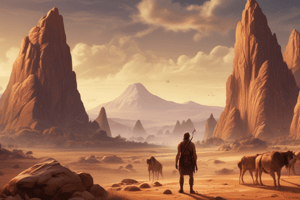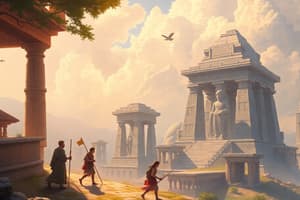Podcast
Questions and Answers
Where did Homo sapiens evolve around 300,000 years ago?
Where did Homo sapiens evolve around 300,000 years ago?
- Americas
- Asia
- Africa (correct)
- Europe
What was the major impact of the Neolithic Revolution?
What was the major impact of the Neolithic Revolution?
- Emergence of feudalism
- Transition to agriculture and settled communities (correct)
- Rise of city-states
- Development of writing
Which civilization developed writing in the form of cuneiform?
Which civilization developed writing in the form of cuneiform?
- Ancient Greeks
- Mesopotamians (correct)
- Romans
- Ancient Egyptians
What was a key characteristic of the Feudal system?
What was a key characteristic of the Feudal system?
What was the main goal of the Crusades?
What was the main goal of the Crusades?
What was the main impact of the Industrial Revolution?
What was the main impact of the Industrial Revolution?
What is a key feature of the Contemporary Period?
What is a key feature of the Contemporary Period?
What is a major challenge facing the global community in the Contemporary Period?
What is a major challenge facing the global community in the Contemporary Period?
Flashcards are hidden until you start studying
Study Notes
Prehistory (Before 3000 BCE)
- Emergence of humans: Homo sapiens evolved in Africa around 300,000 years ago
- Early human societies: Nomadic hunter-gatherers, development of language and social structures
- Neolithic Revolution: Transition to agriculture and settled communities around 10,000 years ago
Ancient Civilizations (3000 BCE - 500 CE)
- Mesopotamia: Sumerians, Babylonians, and Assyrians in modern-day Iraq; developed writing (cuneiform) and cities
- Ancient Egypt: Pyramids, pharaohs, and hieroglyphics; lasted from around 3100 BCE to 30 BCE
- Ancient Greece: City-states like Athens and Sparta; developed democracy, philosophy, and theater
- Ancient Rome: Republic and Empire; expanded through conquests, established law and governance systems
Medieval Period (500 - 1500 CE)
- Fall of the Roman Empire: Fragmentation into smaller kingdoms and the rise of Christianity
- Feudalism: System of lords, vassals, and serfs; characterized by localized power and limited social mobility
- Crusades: Series of military campaigns to reclaim the Holy Land from Muslim rule
Early Modern Period (1500 - 1800 CE)
- Renaissance: Revival of classical learning and cultural achievements in Europe
- Age of Exploration: European powers like Portugal, Spain, and England established colonies and trade routes
- Reformation: Protestant movement challenged Catholic Church authority, leading to religious divisions
Modern Period (1800 - 2000 CE)
- Industrial Revolution: Transition from manual labor to machine-based manufacturing and significant economic growth
- Nationalism: Rise of nation-states and nationalist movements, leading to conflicts and reorganization of global politics
- World Wars: Global conflicts in 1914-1918 and 1939-1945, resulting in massive loss of life and reshaping of global politics
Contemporary Period (2000 CE - present)
- Globalization: Increased interconnectedness and interdependence of economies, cultures, and societies
- Digital Age: Rapid development of technology, especially computing and communication systems
- Ongoing conflicts and challenges: Terrorism, climate change, and social inequality continue to shape global politics and society
Prehistory (Before 3000 BCE)
- Homo sapiens evolved in Africa around 300,000 years ago
- Early human societies developed as nomadic hunter-gatherers, with the emergence of language and social structures
- The Neolithic Revolution occurred around 10,000 years ago, marking a transition to agriculture and settled communities
Ancient Civilizations (3000 BCE - 500 CE)
- The Sumerians, Babylonians, and Assyrians developed writing (cuneiform) and cities in Mesopotamia (modern-day Iraq)
- Ancient Egypt lasted from around 3100 BCE to 30 BCE, during which pyramids, pharaohs, and hieroglyphics were developed
- City-states like Athens and Sparta in Ancient Greece developed democracy, philosophy, and theater
- Ancient Rome expanded through conquests, established law and governance systems, and transitioned from a Republic to an Empire
Medieval Period (500 - 1500 CE)
- The Roman Empire fell, leading to fragmentation into smaller kingdoms and the rise of Christianity
- The feudal system characterized by localized power and limited social mobility emerged, with lords, vassals, and serfs
- The Crusades were a series of military campaigns to reclaim the Holy Land from Muslim rule
Early Modern Period (1500 - 1800 CE)
- The Renaissance revived classical learning and cultural achievements in Europe
- European powers like Portugal, Spain, and England established colonies and trade routes during the Age of Exploration
- The Reformation, a Protestant movement, challenged Catholic Church authority, leading to religious divisions
Modern Period (1800 - 2000 CE)
- The Industrial Revolution transitioned from manual labor to machine-based manufacturing, leading to significant economic growth
- Nationalism led to the rise of nation-states and nationalist movements, resulting in conflicts and reorganization of global politics
- The World Wars (1914-1918 and 1939-1945) resulted in massive loss of life and reshaped global politics
Contemporary Period (2000 CE - present)
- Globalization has increased interconnectedness and interdependence of economies, cultures, and societies
- The Digital Age has been marked by rapid development of technology, especially computing and communication systems
- Ongoing conflicts and challenges include terrorism, climate change, and social inequality, which continue to shape global politics and society
Studying That Suits You
Use AI to generate personalized quizzes and flashcards to suit your learning preferences.




